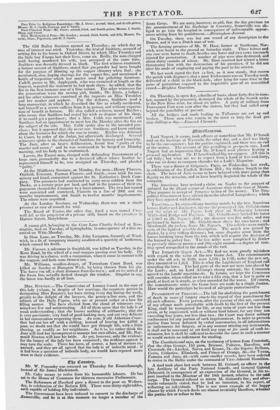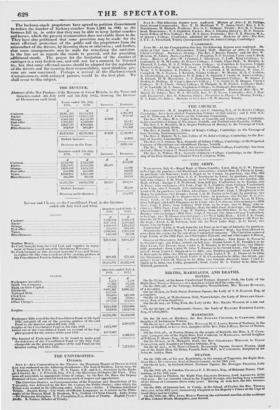filireffanroul.
Lord Nugent, it seems, took offence at something that Mr. D'Ismeli said on the hustings at Wycombe the other day, and a duel was likely- to be the cons-equence ; but the parties explained, and there was an end of the matter. The account of this pistolling in prospectu says, Lord Nugent had an impression that Mr. D'Israeli used phrases bearing a personal application. Mr. D'Israeli talked big, we suppose. All this is sad folly; but what are we to expect from a Lord of five-and-forty, who can sit down to compose charades for a Lady's Magazine.
There was a dinner at Grignon's, Paris, on Wednesday, last week, in celebration of' the English Reform Bill ; Sir Sidney Smyth in the chair. The hero of Acre seems to have behaved with more pomp than dignity on the occasion, and to have heartily disgusted the whole of the company.
The Americans have revived a claim on Naples to the amount of 500,000/. for the illegal seizure of American ships in the time of Murat- They propose to accept of Syracuse in lieu of the money. The Nea- politan Government Inn-e offered them the island of Lampcdosa ; whicla they have rejected with disdain.
Taorrrxii.—In extraordinary trotting match, by the two American horses Rader mil iiodiester, the one the property c f Mr. Osbaldestone and the other of 3Ir. Payne, took place on Wednesday between Wittlesford Bridg,e and Royston. Mr. Oshaldestone backed his horse at 1,0001. to Mr. Payne's;•.;00/. ; the distance was five miles, and was performed in harness. Mr. Osbaldestone drove his own horse ; and. Macdonald, the jockey, drove :Mr. Payne's. The vehicles were match- carts of the lightest possible description. The match was gained by Railer, by a very trifling distance; but some disputes arose from the horses breaking away from the trot, which will require the decision of the learned in jockey law. The live miles were completed by Rader in precisely thirteen minutes and fifty-eight seconds—a degree of trot- ting speed unequalled in the annals of the turf.
THE IMPROVF.D GAME ACT.—We find we were greatly mistaken with regard to the value of the new Game Act. The commitments under the old act, in 1830, were 1,116; in 1:.=31, under the new act, they amounted to 1,203. This is what the Legislature of England call amending the laws. The bad parts of the new act were introduced by the Lords; and, on Lord Althorp's strong entreaty, the Commons agreed to the Lords' amendments. In future, we hope the Commons willconsider, when called on to take a like step, that a law is quite as good, at least, as it stands, as when amended for the worse. Of course, the commitments under the Game-laws are made by a single Justice. Howwould the partridges be insured of adequate proteetneesiPo PUNISHMENT OF FORGERY.—The bill for abolishing the punishment of death in cases of forgery enacts the repeal of that punishment for all such offences. Every person, after the passing of this act, convicted of any offence made punishable with death by the first of the present King, shall be transported for life, or any term of years not less than seven, or be imprisoned, with or without hard labour, for any time not exceeding four years, nor less than two : the Court may direct solitary confinement for any portion of such imprisonment. In order to prevent justice from being defeated by verbal inaccuracies, in all informations or indictments for forgery, or in any mummer uttering any instrument, it shall not be necessary to set forth any copy or fac simile of such in- strument, but it shall be sufficient to describe the same in such a manner as would sustain an indictment for stealing.
The Constitutionnel says, on the testimony of letters from Cronstadt, that the ships George, 110 guns, Brienne, Pultawa, Borodino, and Cronstadt, 84—Lieskoi, Narva, and Krame, 74—the frigates Bellow, Ceres, Catherine, Elizabeth, and Prince of Orange, 56—the Venus, Pomona and Juno, 44—with some smaller vessels, have been ordered to cruise in the Baltic under the command of Vice-Admiral Hamilton.
A duel took place last week between M. Gninard, £171 officer in the late Artillery of the Paris National Guards, and General Gabriel Delessert, in consequence of an expression of the General, in his re- port inserted in the Mon iteur of the 18th instant, relative to the said corps. The General refused to return M. Guinard's fire ; and after- wards voluntarily stated, that he had no intention, in his report, of' reflecting on individuals. This is one more example of the happy chance by which French duels are almost invariably bloodless, whether the parties fire or refuse to fire. The hackney-couch proprietors have agreed to petition Government to reduce the number of hackney-coat:hes from 1,20D to 800, as the iicenses fall in, in order that they may be able to keep •better coaches and horses, which the present remuneration does not enable them to do. They have also petitioned that some provision may be made for the more effectual protection of the public and the proprietors from the misconduct of the drivers, by licensing them or otherwise ; and further, that some arrangements may be made for remedying the omission in the late act as regards the stands in general, and for providing Additional stands. The prayer for the limitation of the, number of +earringeS is a very foolish one, and will. not for a moment be listened 0; but that some effectual means should be adopted for the regulation of the drivers and for insuring their responsibility, most thinking per- sons are now convinced. Perhaps a revival of the Hackney-coach Commissioners, with enlarged powers, would be the best plan. We hall recur to this subject.



























 Previous page
Previous page